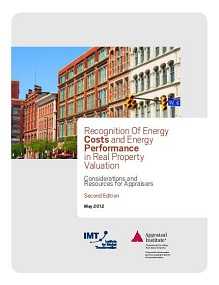In most buildings, energy consumption has significant influence on financial performance. Energy-efficient buildings can create significantly greater net income for owners than otherwise similar buildings that are not so efficient. However, energy efficiency is invisible, and therefore hard for real-estate stakeholders to track—and easy to overlook.
Now that wide segments of the market are demanding green buildings, it’s become vital to provide real estate appraisers with detailed information on how to analyze the effects of energy performance on property value. IMT and the Appraisal Institute address this issue directly in our publication. Its ultimate aim is to enhance credibility of property valuation by helping appraisers and others find, understand, and use available information on energy performance in buildings.
Report highlights include:
- How energy-cost variations affect net operating income and appraised value
- Means for assessing energy performance in buildings
- How to benchmark energy performance
- Qualifications of energy assessors
- Findings on how buyers & renters place incremental value on energy performance
- Appendix with an overview of the most common efficiency measures: insulation, windows, lighting, and HVAC.
